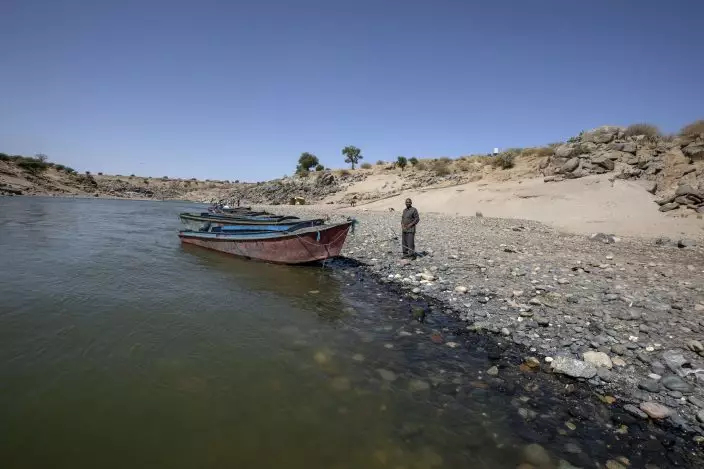Ethiopian forces on Thursday blocked people from the country’s embattled Tigray region from crossing into Sudan at the busiest border crossing point for refugees, Sudanese forces said.
Their account follows allegations by refugees in previous days of Ethiopian forces stopping people from fleeing the month-old deadly conflict in Tigray between Ethiopian forces and Tigray regional forces.
Members of the Sudanese forces, speaking on condition of anonymity because they weren’t authorized to discuss the events, said people tried to cross from Ethiopia around 6 a.m. to Hamdayet in Sudan but were stopped, and refugees waiting on the Sudan side became upset and began throwing rocks.

Sudanese forces stand alert on the banks of the Tekeze River on the Sudan-Ethiopia border after Ethiopian forces blocked people from crossing into Sudan, in Hamdayet, eastern Sudan, Thursday, Dec. 3, 2020. The Sudanese forces, speaking on condition of anonymity because they weren't authorized to discuss the events, said people tried to cross from Ethiopia around 6 a.m. to Hamdayet in Sudan but were stopped, and refugees waiting on the Sudan side became upset and began throwing rocks. (AP PhotoNariman El-Mofty)
The Sudanese forces then cleared the area, and on Thursday evening they confirmed that the border crossing remained closed. The Associated Press around midday saw more than a dozen people waiting on the Ethiopian side of the border.
Tensions have been rising at the border in recent days as the flow of Ethiopians crossing has slowed to hundreds per day from several thousand.
A senior Ethiopian government official who has served as spokesman during the conflict did not immediately respond to a request for comment.

Sudanese forces stand alert on the banks of the Tekeze River on the Sudan-Ethiopia border after Ethiopian forces blocked people from crossing into Sudan, in Hamdayet, eastern Sudan, Thursday, Dec. 3, 2020. The Sudanese forces, speaking on condition of anonymity because they weren't authorized to discuss the events, said people tried to cross from Ethiopia around 6 a.m. to Hamdayet in Sudan but were stopped, and refugees waiting on the Sudan side became upset and began throwing rocks. (AP PhotoNariman El-Mofty)
Asked over the weekend about refugees’ allegations blocked crossings, United Nations refugee chief Filippo Grandi told reporters that his team had not raised the issue with Ethiopia’s government. But refugees told him about the “many checkpoints” and pockets of insecurity they faced as they fled.
“We have not heard of any systematic sealing-off,” Grandi said. “But certainly there are growing difficulties.”
More than 45,000 Ethiopians have fled into the remote area of Sudan, first straining the generosity of local communities and then challenging the capacity of humanitarian groups that have hurried to set up a system to feed, shelter and care for them from scratch.
Nearly half the refugees are children, the U.N. has said, and many people came with nothing. Refugees have recounted horrific journeys of fleeing attacks and arriving on foot after two or three days of walking in the heat.
Authorities have said they are preparing for as many as 100,000 refugees. But Ethiopia's government has said it welcomes the refugees to come home for reintegration and has vowed their protection.
Many of the refugees, mainly ethnic Tigrayans, have said it was Ethiopian forces they were fleeing.


